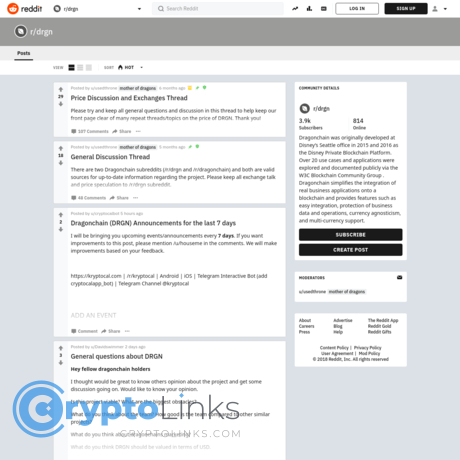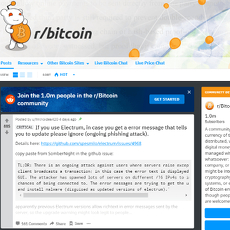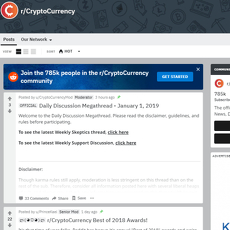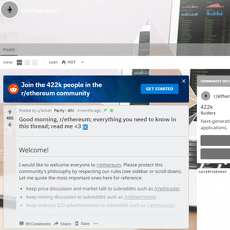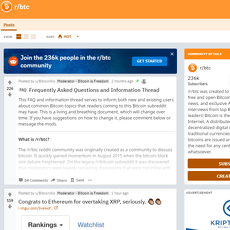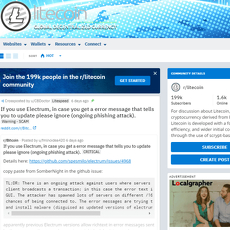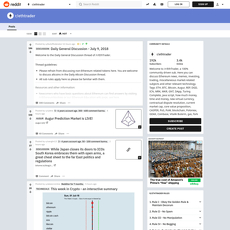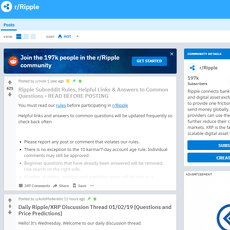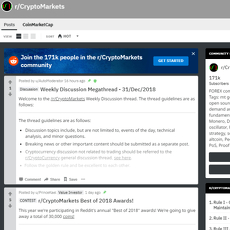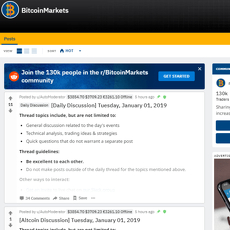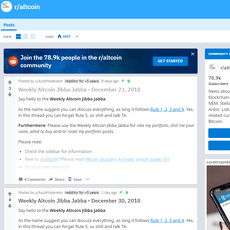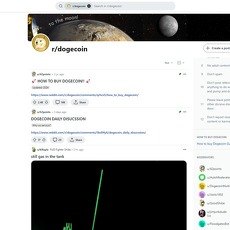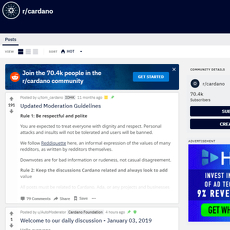r/drgn Review
r/drgn
www.reddit.com
r/drgn Reddit Review Guide: Everything You Need to Know (with FAQ)
Thinking about using r/drgn to keep up with Dragonchain but worried it’ll be a time sink? Wondering how to skim past hype and find what actually matters?
I’m going to show you how to use r/drgn like a pro—so you spend less time scrolling and more time learning what’s real, what’s new, and what’s worth a follow-up.
The common pain: too much noise, not enough signal
Reddit is incredible for spotting early signals, but it’s also notorious for hot takes and repeats. That’s not just a feeling—research shows noisy feeds can push people toward faster, lower-quality decisions. For example, a well-known MIT study on misinformation found that sensational content tends to travel faster than accurate updates. And Nielsen Norman’s eyetracking studies show we scan, not read—so the layout of the feed itself can trick you into missing the good stuff.
Here’s how to cut through the noise on r/drgn fast:
- Scan the flairs first. Look for high-signal flairs like News, Announcement, Dev, or Weekly. Skip memes and generic “thoughts?” posts when you’re short on time.
- Use pinned posts. Pinned items often collect official links, recurring megathreads, or time-sensitive updates. If there’s a weekly or monthly thread, make it your first stop.
- Sort smart. Filter by Top → This Month or Top → This Year to surface durable, well-received posts. Then switch to New for fresh items to track.
- Search like a researcher. Use Google with
site:reddit.com/r/drgnto find specific topics:site:reddit.com/r/drgn dev updatesite:reddit.com/r/drgn announcementsite:reddit.com/r/drgn AMAsite:reddit.com/r/drgn partnership
- Watch for sourcing. Posts that link to official domains, docs, or code repos are usually worth a read. Screenshots without sources? Treat as unconfirmed.
“If it’s not linked, it’s not confirmed.”
Following this checklist alone will eliminate most low-quality threads you’d otherwise wade through.
What I’ll help you do (the promise)
By the end of this guide, you’ll know:
- How r/drgn works and where the best content lives
- Which flairs and weekly threads are worth your attention
- How to verify claims before you share, trade, or commit time
- How to plug into the community and get helpful replies
I’ll also answer the questions people usually type into Google, like:
- What is Dragonchain (DRGN)?
- Is DRGN an ERC‑20 token?
- Is Dragonchain still active?
- Where can I buy DRGN?
- How do I stake or earn with DRGN?
- Is Dragonchain open source and where’s the code?
Who this guide is for
- Newcomers who want a quick, safe way to get oriented
- Holders who want smarter updates without doomscrolling
- Researchers who use Reddit as a checkpoint before decisions
If you’re allergic to hype and want context with sources, you’re in the right place.
Quick win: how to start using r/drgn in 5 minutes
Set a timer for five minutes. Do this:
- 1. Open r/drgn. Go to reddit.com/r/drgn.
- 2. Sort by Top → This Month. Open the top 3–5 posts in new tabs. These are your highest-signal starters.
- 3. Check pinned items. Look for a weekly or monthly megathread. If it exists, read the top comment and any linked official sources.
- 4. Filter by flairs. Skim for News, Announcement, and Dev flairs. Open only what cites an official link (site, docs, or repo).
- 5. Run one targeted search. In Google:
site:reddit.com/r/drgn “roadmap”orsite:reddit.com/r/drgn “partnership”and note any recurring sources you see referenced.
Bonus: If a claim looks important, open a new tab and cross-check it against an official domain or code repo before you file it under “real.” That tiny habit saves hours later.
Why this works: Top → This Month compresses weeks of community judgment into a short list, pinned posts funnel you to canonical info, and targeted searches reveal patterns without you chasing every thread. It’s a small routine with a huge payoff.
Ready to make that five-minute routine even stronger? Up next, I’ll show what r/drgn actually covers, how the subreddit is structured, and how it fits into the bigger Dragonchain ecosystem—so you know exactly where to look first. Curious which flairs tend to be most reliable and why? Let’s unpack that next.
What r/drgn is and how the subreddit is set up
r/drgn is the community corner for Dragonchain and the DRGN token. Think of it as a public checkpoint where holders, builders, and curious onlookers trade notes on technology progress, announcements, and practical use cases. It’s not just a ticker-watching space; it’s where people compare sources, challenge claims, and link back to official materials when something big lands.
In the broader Dragonchain ecosystem, r/drgn sits between official channels (foundation announcements, docs, GitHub) and fast-moving social feeds (X/Discord). The subreddit gives you an organized history of what people noticed, what they questioned, and what they verified—useful context you can’t always capture in a tweet thread.
“Clear rules are kindness; chaos wastes everyone’s time.”
The purpose of r/drgn
Here’s the core focus I see day-to-day:
- Technology: Architecture explainers, node questions, scaling benchmarks, and integration talk (APIs, SDKs, hybrid deployments).
- DRGN-related news: Links to official releases, press mentions, audits, and ecosystem updates—usually with community reactions and fact-checks.
- Community updates: AMAs, event recaps, tool releases, tutorials, and resources for getting hands-on.
- Real-world use: Partnerships and pilots, what’s live vs. proposed, and how to verify claims against public repos or company posts.
When something noteworthy happens—say, a new integration or a policy update—the best posts don’t just hype it. They link sources, add context, and invite scrutiny. That’s the value: curated curiosity with receipts.
Rules, flairs, and moderation basics
Good subreddits run on healthy boundaries. r/drgn uses a straightforward rule set to keep signal high. While exact wording can change, here’s what consistently matters:
- Source your claims: If you post “X partner confirmed,” expect to be asked for an official link. Screenshots alone usually aren’t enough.
- No referral links or spam: Low-effort promos, pump language, and fake giveaways get removed fast.
- Keep price talk in its lane: Many crypto subs channel charts/speculation into weekly threads to prevent clutter.
- Civility: Attack ideas, not people. Heated debate is fine; harassment isn’t.
- Use flairs: Posts tagged correctly help everyone find what they need.
Expect a mix of human mods and AutoModerator. You’ll often see removals with a short reason (“use the megathread,” “needs sources,” “off-topic”). That might feel strict, but it’s a feature, not a bug. Research on online communities has repeatedly shown that active, transparent moderation correlates with healthier discussions and better newcomer retention over time (see work by Matias, 2019; Chandrasekharan et al., 2018 in HCI/ACM venues).
Flairs are your friend. Typical labels you’ll run into:
- News / Announcement: Official updates or reputable coverage.
- Dev / Technical: Repos, architecture questions, performance notes, how-to guides.
- Question / Help: Wallet issues, node setup, “where’s the source?”
- Discussion / Opinion: Thoughtful takes or synthesis posts.
- Megathread / Weekly: Aggregated posts for price, newbie questions, or event chatter.
I like to filter by these when I’m short on time. If I’m hunting for hard info, I scan News and Dev first, then swing back to Discussion when I want the community’s take.
Pinned posts and recurring threads
Pinned posts sit at the top of r/drgn for a reason—they’re the fastest way to get current without doomscrolling. You’ll typically see:
- Announcements: A link or summary to an official update with context and discussion.
- Weekly Q&A or Discussion: A catch-all for questions that would otherwise flood the feed.
- Market/Price Megathread: Keeps chart talk in one place so technical and ecosystem posts don’t get buried.
- Event or AMA threads: Scheduled chats, livestreams, or post-event recaps with timestamps and key takeaways.
Examples you’ll often see:
- “Weekly r/drgn Q&A — Ask anything about nodes, TPS, or business adoption”
- “Megathread: Foundation Update (YYYY-MM-DD) — links, discussions, and clarifications”
- “Technical Thread: Integrations, SDK questions, repo updates”
Why this matters: pinned and recurring threads reduce duplicates, funnel similar topics together, and make it easier for mods and experts to spot and answer the right questions. In fact, research on community design shows that stickied “shared attention” posts can improve information retrieval and lower moderation load because users know where to look (and where to post) for common needs.
When I land on r/drgn, I always check what’s pinned before anything else. If the latest announcement is sticky, I read that. If there’s a weekly thread, I scan the top comments for distilled insights and source links. It’s the highest “insight-per-minute” move you can make here.
So now that you know how the subreddit is structured, do you want the exact routine I use to pull signal fast—sorting tricks, search hacks, and the flairs that consistently surface the good stuff? That’s up next.
How to get real value from r/drgn (my practical playbook)
You don’t need endless scrolling to get signal. You need a tight routine that finds the best posts, confirms what matters, and helps you ask the kind of questions people actually answer. Here’s the exact workflow I use to turn r/drgn into a research channel instead of a time sink.
“Trust, but verify.”
Smart sorting and search
Most people browse by “Hot” and call it a day. That’s where you get hype and repeats. If you want original, useful content, switch your default flows:
- Top → This Month/This Year: Surfaces posts that earned real community approval over time. It filters out low-effort spikes. I start here to catch milestone updates and standout analysis.
- New → Filter with intent: If you want the earliest read on updates, check New—then skim titles by flair and domain. Link posts from official domains usually beat screenshots and hearsay.
- Use Reddit’s search operators right inside r/drgn:
- author:AutoModerator — Finds recurring weekly/monthly threads.
- title:"Weekly" OR title:"Megathread" — Pulls routine hubs for news and Q&A.
- url:dragonchain.com — Shows posts linking directly to official pages.
- flair_name:"Announcement" or flair_name:"Development" — Targets high-signal buckets if the subreddit uses these flairs.
- Google it, but scoped: If Reddit search feels noisy, use Google with site filters:
- site:reddit.com/r/drgn partnership
- site:reddit.com/r/drgn "dev update"
- site:reddit.com/r/drgn AMA
Pro tip: When you spot a helpful comment with sources, sort comments by “Top” or “Q&A” (on relevant threads). It often reveals the best verification work without reading every reply.
Flairs to focus on
Flair names vary across time, but a few categories almost always deliver value. When you’re short on time, prioritize:
- Announcement: Highest signal for official updates and community-wide news. I skim these first.
- Development / Dev Update: Good for tracking technical progress, repos, and integrations.
- Research / Analysis: Community DD, timelines, and sourced breakdowns—often underrated.
- Megathread: Weekly or monthly hubs centralize links, questions, and summaries.
When you’re in a rush, skip or save for later:
- Memes or Hype: Fun, but not actionable.
- Pure price talk: Unless you see data, models, or references, it’s not worth immediate attention.
Quick filter move: on desktop, use the flair bar (or the “filter by flair” dropdown) to hide everything except your priority flairs. This turns chaos into a clean reading list.
Verifying claims before you act
If a post could push you to trade, stake, or share publicly, treat it like due diligence. A 2018 MIT study found that false news spreads faster than truth on social platforms—especially when it triggers emotion. That’s your cue to slow down for two minutes and run this checklist.
- Source check:
- Is the link from an official domain (e.g., company website, docs, or verified social)? If it’s a screenshot, look for a matching link in comments.
- For partnerships, check the other party’s site or socials. Real deals are mutual.
- Timestamp sanity:
- Does the news show up across official channels within a reasonable window? Huge gaps are a red flag.
- Use Wayback Machine or archive.ph to freeze pages and catch edits.
- Code or tech claims:
- Look for links to GitHub or other repos. Confirm the repo is official and the commit activity matches the claim.
- Scan release notes and contributors—sockpuppet repos are easy to spot.
- Token and contracts:
- When a post references a contract, never copy from screenshots. Find contract links via official pages, then confirm on Etherscan with a verified token profile.
- Beware of “airdrop” or “migration” claims that require you to connect a wallet immediately.
- Charts and metrics:
- Ask: what’s the data source? Check with a second tracker (e.g., a widely used aggregator) to avoid cherry-picked visuals.
- Look for context: timeframe, exchanges included, and whether volume is organic or wash-prone.
- Community corroboration:
- Sort comments by “Top” and scan for users dropping links, not opinions.
- If mods add a “Verified” note or sticky a clarification, that’s your green light.
Emotional trigger check: If a post makes you feel urgent, triumphant, or panicked, that’s often a tactic. Pause. Re-run the checklist. You’ll thank yourself later.
Engagement without regret
Getting answers isn’t about being loud—it’s about being clear, specific, and helpful to reply to. Here’s how to engage in a way that earns you quality responses and a better read from the room.
- Ask smart questions:
- Lead with context: “I saw [link]. I searched via title:'Weekly' and didn’t find a follow-up. Is there an official source for X?”
- One question per post. Add a short TL;DR. People reward effort.
- Share how you verified:
- Post the 2–3 links you checked, even if you’re unsure. It signals good faith and invites better corrections.
- If you changed your view after a reply, say so. That builds reputation fast.
- Use the right threads:
- Drop general questions and price chatter into weekly megathreads. Save standalone posts for new info, research, or walkthroughs.
- For AMAs or official updates, switch comment sorting to “Q&A” or “Top” to avoid back-and-forth noise.
- Protect yourself:
- Never reply to DMs offering support, giveaways, or “exclusive” claims. Report and move on.
- When in doubt, ping mods via Modmail and keep everything on the record.
- Be the user you want to read:
- Timestamp videos, quote exact lines, and include permanent links (use web archives for longevity).
- Upvote verified answers, not just agreeable ones. The sub’s signal improves when you reward good sourcing.
Small rhythm, big payoff: I spend 3–5 minutes on Top/This Month, 2 minutes on New with flair filters, and 2 minutes running the verification checklist on anything that might affect a decision. That’s under 10 minutes and almost zero noise.
You’ve now got the method. But what should you actually expect to see when you apply it—what topics tend to trend, and which ones deserve your attention first? In the next section, I’ll break down the conversations that show up most on r/drgn and what they signal for you. Which do you think dominates: partnerships, tech updates, or market chatter?
What people talk about most on r/drgn
“Signal beats speed. Every time.” That’s the mindset I bring when I scroll r/drgn. The best threads aren’t loud — they’re sourced, specific, and useful. Here’s what usually bubbles to the top and how to read it without getting pulled into hype spirals.
News, partnerships, and announcements
This is where excitement — and confusion — usually starts. Real updates can move fast, but speculation moves faster. I keep it simple:
- Ask for the origin: Is there a link to an official blog, newsroom, or release note? If a post claims “partnered with X,” I look for a matching statement on the partner’s website or newsroom. No cross-posted confirmation? It’s a rumor until proven.
- Kill it with context: Screenshots are easy to fake. I check for timestamps, URLs, and whether the logo/image exists elsewhere. Reverse image search helps.
- Trace the breadcrumbs: I use site:newsroom + Dragonchain or "Dragonchain" site:*.com press to find original mentions.
- Check the thread health: High-quality news posts on r/drgn usually include links, dates, and mod-approved flairs. If comments are full of “source?” and no one replies with proof, that’s your answer.
“Trust, but verify.” In crypto, the second part is where your edge lives.
Real-world example pattern: A user posts “Major enterprise integration.” I look for: the enterprise’s newsroom, a company blog, a LinkedIn post from a verified employee, or a GitHub release that references the integration by name. If none of those exist, I treat it as “promising noise,” not actionable news.
Tech and development talk
When the conversation turns technical, it’s usually about architecture, performance, and integrations. Even if you’re not a developer, you can keep up by anchoring to three questions:
- What problem is being solved? Throughput, cost, security, or interoperability?
- How is it measured? Benchmarks, testnets, public repos, or reproducible demos?
- What actually shipped? Release version, commit hash, or API change you can see.
How I follow along without getting lost:
- Pin to proof: I look for links to code or docs. A thread that cites a GitHub issue or release note beats a wall of buzzwords. You can quickly scan activity via GitHub search or the project’s org page if available.
- Translation trick: I convert jargon into plain asks: “Does this reduce fees?” “Is it live?” “What breaks if this fails?” Good threads answer these directly.
- Look for before/after: If someone claims “10x faster,” I want the old number, the new number, and the test conditions.
Strong tech threads on r/drgn often have an explainer tone, ELI5 summaries, and references to documentation. That’s the stuff worth bookmarking.
Token and market chatter
Mods on focused subreddits usually corral price talk into megathreads to keep noise low. Expect rules around “no price targets,” “no referral links,” and “no spammy TA.” When market posts do show up, I filter with a few fast checks:
- Timeframe clarity: Intraday, weekly, or cycle-level? A 5-minute chart and a 1-year thesis aren’t the same animal.
- Risk management: Real analysis includes invalidation points and downside scenarios. “Guaranteed breakout” is code for “pass.”
- Evidence, not adjectives: If it’s “undervalued,” show on-chain metrics, liquidity depth, or a catalyst timeline. If it’s “going to the moon,” I keep scrolling.
On the social side, independent analytics firms like LunarCrush, Santiment, and The TIE have reported that spikes in Reddit/Twitter mentions often correlate with short-term volatility. Helpful? Yes. Predictive? Sometimes. Causation? Not guaranteed. I treat social metrics as “heads-up,” not “green light.”
My sanity saver: I zoom out to 90-day or 180-day views, keep notes on actual catalysts (releases, integrations, listings), and avoid posts that reduce everything to a single line going up or down.
Quick answers to common questions (People Also Ask)
These come up a lot in r/drgn threads and DMs. Here’s the straight talk so you don’t have to bounce between tabs:
- Is r/drgn an official channel? It’s typically community-run with mod oversight. Official announcements should be confirmed on the project’s website or verified social accounts. Treat Reddit as a discussion hub, not a source of record.
- Where do I confirm a partnership or press mention? Check the partner’s newsroom first, the project’s official blog, and reputable industry outlets. Use a quick search like site:partnerdomain.com press “Dragonchain”.
- Can I talk about price? Usually yes, but often within specific daily/weekly threads. Read the sidebar rules to avoid removals.
- How do I follow development progress? Look for links to public repos, release notes, and issue trackers. If a thread claims a release, ask for the version tag or commit link.
- Is DRGN an ERC‑20 and which wallet should I use? Token standards and networks can change. If DRGN is on Ethereum, most Ethereum‑compatible wallets support it — but only use the contract address listed on the official site and double‑check it on a trusted block explorer. Never trust a contract pasted by a random commenter.
- Are airdrops or giveaways allowed? Most subreddits ban wallet-collecting “airdrops.” If you see one, assume it’s a phishing attempt unless it’s posted by mods and linked to official pages.
- How do I spot scams fast? No mod flair, no source, asks for DMs, or wants your seed phrase — instant report. No legit support team will ask for keys. Ever.
- Where’s the roadmap? Roadmaps move. Look for the most recent version on the official site or in pinned documentation; if the subreddit mentions a change, expect a link to back it up.
- Is this post shilling? Signs include vague language, no sources, referral codes, and new accounts with one‑note posting histories. Quality posts cite links and invite scrutiny.
Here’s the thing: the threads you choose to believe shape your outcomes. Want a simple way to judge which posts deserve your attention — and which subreddits are worth your time at all? In the next part, I’ll show you the exact checklist I use to rate a crypto subreddit on activity, originality, moderation quality, and tone. Curious which boxes r/drgn actually ticks?
My review criteria: how I judge the quality of a crypto subreddit
I keep a simple checklist to figure out whether r/drgn is worth your time. It’s the same framework I use across crypto subs, and it keeps me honest when the hype machine gets loud.
Activity and consistency
Healthy communities don’t just get loud; they show up regularly. I look for steady patterns rather than sugar highs.
- Rhythm over spikes: A consistent cadence (even a few meaningful posts per week) beats a one-day moonshot of “soon” posts. Sudden surges around rumors or listings can look like growth but often fade fast.
- Comment-to-post ratio: I track whether threads attract real discussion. A rough rule I use: a monthly median of 5–15 comments per post suggests engagement over link-drops. It’s not gospel, just a quick pulse check.
- Unique voices matter: I skim the top posts and note how many different authors appear. If it’s the same handful of accounts carrying everything, that’s fragile.
- Week-over-week stability: I scroll “Top” for This Month and Last Month. If the tone and participation look similar, that’s organic. Wild swings often mean brigading or coordinated campaigns.
- Cross-post sniff test: A burst of traffic from r/CryptoCurrency or a trading sub can be legit. I check whether newcomers stick around in follow-up threads. If they don’t, it was a flyby.
Quick routine I use in under 3 minutes:
- Sort by Top → This Month and scan the first 20 posts.
- Open 3–5 high-comment threads and skim for quality replies, not just cheerleading.
- Check author variety and how many comments add sources or code links.
“In most online communities, 90% of users are lurkers who never contribute, 9% contribute a little, and 1% account for almost all contributions.” — Nielsen Norman Group
I keep that in mind to avoid overreacting to quiet periods. The question isn’t “Is it loud?” It’s “Is the 1% creating signal the rest can use?”
Originality and depth
Signal shows up as work. I reward posts that move the Dragonchain conversation forward, not just recycle tweets.
- Primary sources: I up-rank threads that link to GitHub repos, official docs, release notes, or on-chain explorers. Screenshots of DMs or charts without context get a mental penalty.
- Explanations over hints: Good posts explain what changed, why it matters, and how to verify. “Big partnership soon” without a filing, contract, or credible reference is just noise.
- Hands-on contributions: Tutorials, SDK examples, node setup notes, benchmarking attempts, or community tools (dashboards, scripts) are pure gold. I bookmark those.
- Dev presence: When devs or knowledgeable contributors chime in, I take it as a green flag—especially if they correct misconceptions, not just promote updates.
My quick litmus test for a high-signal post:
- At least one verifiable source (release note, repo commit, official announcement).
- A clear claim and a simple replication path (“run this command,” “check this hash,” “compare these commits”).
- Context versus other chains or prior versions (what’s faster, cheaper, or different now?).
As a personal heuristic, a subreddit earns trust with a baseline of text-based analysis and OC work. If 20–30% of top monthly posts are thoughtful write-ups or tool shares, I’m paying attention.
Moderation quality and transparency
Good mods are gardeners, not gatekeepers. They prune spam so the real conversations can breathe.
- Visible rules and flairs: Clear rules, enforced flairs (Announcements, Tech, Questions), and pinned megathreads for price talk or rumors are all signals of care.
- Removal reasons: When posts vanish, a short “why” from a bot or mod keeps trust intact. Silent wipes erode confidence fast.
- Spam and referral control: Crypto subs attract a ton of low-effort promos. If r/drgn keeps that in check while letting critical threads live, that’s a strong sign.
- AMA cadence: Scheduled AMAs or Q&As with builders, even quarterly, tells me the mod team can coordinate with the project and the community.
Red flags I note down:
- One mod account dominates announcements or farmed referral links appear unchecked.
- Price-only posts outside megathreads keep slipping through.
- Critical but well-sourced posts disappear without explanation.
Hype is easy. Trust is rare. Transparent moderation is the bridge between the two.
Sentiment and civility
Markets swing. Communities don’t have to.
- Constructive disagreement: I want to see top comments that challenge assumptions with facts and get upvoted for it. That’s the hallmark of a resilient sub.
- Heat vs. light: Sarcasm and one-liners are fine, but if they drown out thoughtful replies, signal drops. I scan for sourced counterpoints and polite pushback.
- Brigading tells: Repetitive phrasing, brand-new accounts flooding threads, and identical talking points are classic signs. I discount those waves heavily.
- Room for skeptics: If a tough but fair critique holds a positive score and stays open, moderation has the right balance.
Mini-metric I use: in the monthly top 10, I want at least two posts that are critical or cautionary yet well-received. If everything is “to the moon,” I expect hard landings.
Timeline review: past highlights worth knowing
I do a fast history pass to understand context before trusting current sentiment.
- Top → All-time scan: I note the years of the biggest posts and what they were about (major releases, partnerships, AMAs, regulatory news). Patterns matter.
- Then vs. now: I open a few old high-signal threads and compare how the community treated big claims back then versus today. Are lessons learned? Is sourcing better now?
- Cross-checking claims: For anything that sounds pivotal, I look for a matching official post, repo tag, or reputable news coverage. If links are dead, I check the Wayback Machine.
- AMAs and dev updates: A timeline with recurring builder updates signals staying power. One-off spikes without follow-through usually age poorly.
What I’m really mapping is this: did the subreddit grow up? Mature communities reference their own history—both wins and missteps—and use it to guide the next conversation.
If you want to copy this framework for r/drgn today, I’ll make it even easier in the next section: want a short list of official links, trackers, and tools that pair perfectly with this workflow so you can verify claims in seconds instead of hours?
Helpful resources to pair with r/drgn
I keep a simple rule when I’m scanning r/drgn: never rely on one source. A quick cross-check with official links, code, and neutral trackers will save you from hype and old screenshots. There’s even a well-cited Science study showing that false stories spread faster than true ones on social platforms—so stacking sources is not optional if you value your time.
Why cross-check? False news travels farther and faster than the truth on social media (Science, 2018). Two minutes of verification beats two weeks of regret.
Official and community touchpoints
- Homepage and blog: Start with the source. Check the latest announcements and updates on dragonchain.com and the official blog. If a Reddit post claims “new partnership,” look for a matching blog or press note here first.
- Code and issues (public repos): For anything technical, go straight to the commits and releases on GitHub: dragonchain. I like to click Watch → Custom → Releases on key repos so I’m notified when something actually ships.
- Official social links: When a post references a tweet or community space, find the verified links via the official site (footer or “Community” sections). That way you’re not chasing impostor accounts.
- Moderation transparency for r/drgn: If you’re curious whether a discussion was removed and why, check Reveddit for r/drgn. It’s a helpful sanity check when a thread disappears.
Pro tip: On any claim made in a thread, ask yourself: “Is there a primary source link?” If not, hunt for it using the links above before you share or act.
Research boosters and trackers
- Market reference pages: Use neutral profiles to confirm contract details, supply, and listings: CoinMarketCap: Dragonchain and CoinGecko: Dragonchain. From there, click through to the official contract and explorer links—don’t copy addresses from random comments.
- News monitoring (set-and-forget): - CryptoPanic search: “Dragonchain” to scan headlines across outlets.
- Google Alerts for “Dragonchain” and “DRGN” to catch new press or mentions without manual checks.
- Feedly RSS collections for the blog and any dev feeds you follow. - Social and sentiment snapshots: If you track social buzz as a complement (not a signal by itself), check LunarCrush and filter for DRGN. I use this to spot unusual spikes and then move straight to primary sources to confirm what’s behind them.
- Source preservation (for tweets and press): - Wayback Machine for capturing official pages before they change.
- archive.ph to snapshot posts that might get edited or deleted. - Change tracking: Use Distill Web Monitor to watch specific pages (e.g., a docs page or roadmap). I set it to alert me if titles or sections change, which helps validate “updated!” claims on Reddit.
Mini-checklist I use before I trust a big claim:
- Find it on the official blog or a verified social link from the homepage.
- Check for supporting activity on GitHub (commits, issues, or releases).
- Confirm core details on CMC or CoinGecko if the claim involves listings, contracts, or supply.
- Capture the source with Wayback or archive.ph if it’s likely to vanish.
Want to know whether the subreddit is “official,” what to follow first each week, and the easiest way to avoid shilling without missing real news? I’ll answer all of that next.
FAQ: Everything you need to know about r/drgn
Is r/drgn “official,” and who runs it?
Short answer: it’s a community-run subreddit. Most crypto subreddits are managed by volunteer moderators who enforce rules, remove spam, and keep the place tidy. That’s a good thing—it reduces hype and keeps conversations focused. But it also means you should always verify anything that sounds like an “official” announcement.
Here’s how I confirm whether something posted on r/drgn is official:
- Check the source link: Does the post link to an official domain (company site, docs, or verified social)?
- Cross-check on primary channels:
- Company website or newsroom
- Official X/Telegram/Discord (whatever the project lists publicly)
- GitHub org for code or release notes
- Look for mod flair: Mods often tag legit items with “Announcement” or a similar flair when appropriate.
- Scan user history: If a “new account” drops a bombshell without any track record, slow down.
Example: If someone posts “New enterprise partnership signed!” with a blurry screenshot, I’ll look for a press release on the company’s newsroom and a matching note on Dragonchain’s official channels. If neither exists, I treat it as unconfirmed until it does.
Rule of thumb: screenshots are conversation starters, not proof.
How active is r/drgn and what should I follow first?
Expect a steady rhythm with occasional spikes around releases, AMAs, or news. It’s not a megaphone like the big-cap subs, which is fine—smaller communities often mean better signal if you know where to look.
Here’s a simple way to stay on top of things without living on Reddit:
- Tap the bell on the subreddit page to enable post notifications for higher-signal items.
- Daily, 2–3 minutes: Scan Pinned posts and the newest thread titles for anything tagged as news, dev, or announcement.
- Twice a week, 5 minutes: Sort by Top → This Week and skim the top 5–7 posts. You’ll catch most of the important stuff this way.
- Weekly, 10 minutes: Read the latest megathread (if present) and search the “dev” or “announcement” flair for deeper updates.
Sample routine: Monday—Top This Week for context. Midweek—check dev-tagged posts. Friday—scan pinned and any weekly wrap-up. Done.
Staying safe: scams, shilling, and red flags
Crypto communities attract scammers. r/drgn is moderated, but nothing is perfectly clean. I use a lightweight checklist to keep my wallet and attention intact.
Classic red flags I ignore on sight:
- Fake airdrops/giveaways: “Send 0.2 ETH to receive 2 ETH,” or “Claim DRGN airdrop” via a random site.
- DM “support” reps: No legit team will cold-DM you to fix a wallet issue or recover tokens.
- Impersonation: Usernames that swap characters (l vs I), copy the logo, and reply fast to every question.
- Partnership claims with no link: Screenshots or “he said, she said” without a press release or matching official post.
- File drops: Unsolicited PDFs, APKs, “whitepapers,” or “research tools” in comments or DMs.
- Signer traps: “Connect wallet to claim” on an unknown domain; approvals can drain tokens.
My protection checklist before I click or act:
- Open links in a sandboxed browser profile or mobile device with no keys.
- Double-check domains letter-by-letter. Bookmark official links.
- Verify on at least two official channels (site + GitHub or site + X).
- If it involves money, wait 24 hours. Scams rely on urgency.
How to report problems on Reddit:
- Use the Report button under a post or comment.
- Click Message the Mods in the subreddit sidebar for urgent issues.
- Learn Reddit’s safety basics here: Reddit Help: Reporting.
Why this matters: Industry research continues to show that social media is a major venue for crypto scams and impersonation. For background reading, check the latest Chainalysis Crypto Crime Report and the FTC’s Data Spotlights on social-media-related fraud. You don’t need the stats to be careful—you just need a process.
Conclusion: My take and your next steps
r/drgn works well as a community checkpoint when you pair it with a clear routine and quick verification. Treat big claims as unconfirmed until they match an official source, stick to flaired and pinned threads when you’re short on time, and avoid engaging with anything that smells like urgency or easy money.
Your move:
- Bookmark r/drgn and enable the bell for smarter alerts.
- Use a weekly Top-sort scan to catch the highest-signal posts fast.
- Confirm announcements via official channels before you trade, bridge, or connect a wallet.
Do that, and you’ll get the upside of the subreddit—real updates and useful discussion—without the usual noise tax.

